初中英语七年级上册牛津版知识点练习
牛津版初中英语七年级上册课后辅导练习
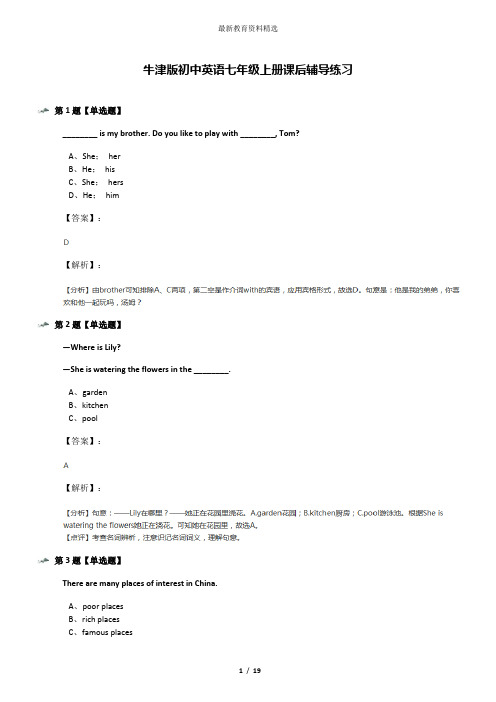
牛津版初中英语七年级上册课后辅导练习第1题【单选题】________ is my brother. Do you like to play with ________, Tom?A、She;herB、He;hisC、She;hersD、He;him【答案】:【解析】:第2题【单选题】—Where is Lily?—She is watering the flowers in the ________.A、gardenB、kitchenC、pool【答案】:【解析】:第3题【单选题】There are many places of interest in China.A、poor placesB、rich placesC、famous places【答案】:【解析】:第4题【单选题】— You look very pretty today.— _______.A、Oh, I don"tB、Thank youC、The same to youD、No, I"m not【答案】:【解析】:第5题【单选题】Lucy is standing in the centre of the square.A、outsideB、insideC、middle【答案】:【解析】:第6题【单选题】—Do you know how old Miss Liu is?—I don"t know exactly how old she is, but I think she is around thirty.A、aboutB、overC、only【答案】:【解析】:第7题【单选题】He will return home tomorrow.A、work atB、come backC、leave【答案】:【解析】:第8题【单选题】Some languages have only _____ speakers.A、fewB、a fewC、littleD、a little【答案】:【解析】:第9题【单选题】一Do you want to visit Shanghai?一Yes, certainly.A、go toB、live inC、study in【答案】:【解析】:第10题【单选题】If you ________ the books with a rope, you hold them together.A、putB、tieC、throw【答案】:【解析】:第11题【单选题】—When can I go out to play?—Finish your homework first,or I _______ let you go out.A、don"tB、didn"tC、won"tD、haven"t【答案】:【解析】:第12题【单选题】Studying in groups is necessary ______you want to do well in school.A、ifB、untilC、unlessD、though【答案】:【解析】:第13题【单选题】I"ll give the book to him if he _______ here next Sunday.A、will comeB、comesC、is comingD、came【答案】:【解析】:第14题【单选题】A ______ is a book used for a daily record of events, thoughts, etc.A、diaryB、novelC、textbook【答案】:【解析】:第15题【单选题】If more trees _______ planted, our city will be more beautiful.A、wereB、areC、will be【答案】:【解析】:第16题【单选题】—What are they talking ________?—I am not sure. Because they are talking ______English, I don"t know English .A、to; withB、to; inC、with; aboutD、about; in【答案】:【解析】:第17题【完形填空】根据短文理解,从A、B、C、D四个选项中选择最佳答案填空。
牛津英语七年级上册期末复习知识点整理

牛津英语七年级上册期末复习知识点整理译林版牛津英语七年级上册期末复知识点整理Units1--4重点知识点总结n.名词v.动词vt.及物动词vi.不及物动词adj.形容词adv.副词prep.介词pron.代词conj.连词1、喜欢like / love / enjoy / be XXX (痴迷于)/ have fun / have a good time +doing sth.动词+doing的还有Go XXX good at doing sth./ do well in doing sth.XXX.2、“四大看”read vt.看读物(XXX等)look vi.瞧常用短语look at/ for/around/after/out/over/upsee vt.瞥见,夸大成效I can see you.watch vt.带有观赏性的寓目watch TV/ a film / a football game3、“五大穿着”Put on强调“穿上”的动作XXX ____XXX.Wear强调“穿着”的状态;进行时态表示暂时的情况XXX glassesDress(1)dress sb.(2) dress oneself(3) dress up as(4) get dressedIn(穿戴)后接颜色(或衣服),表示状态look!XXX is_____a XXX后接人指衣服穿在某人身上看出区别来。
The red coat looks nice on you.4、“四大花费”XXX:sb.(人)+ XXX.sb.(人)+ spend +工夫/款项+(in) XXX.pay:sb.(人)+pay +款项+for sth.cost:sth.(物)+ cost + sb.+金钱XXX时间XXX:it XXX sb. +时间+ to do sth.5、“三大地点副词”Home / there /here前不加任何的介词welcome home / come here / go there6、“三大使役动词”Make sb. do sth./ have sb. do sth. / let sb.do sth.7、晤面打号召用语(1)Nice to meet you . (2) Glad to meet you . (3) How are you ? (4) How are you doing ?(5)How is it going ?(6)How is everything going?(7) What’s up?8、基数词+year(s)+old透露表现“…岁”发问用“how old”名词性短语数词-year-old也透露表现年岁,但其为描述词性短语“前有冠词后著名(词)”Eg. Helen is 11 years old = Helen is an 11-year-old girl.9、Let’s与let us的区分Let’s do sth.指包括听者(对方)和说者(我们)都在内,表示建议Let us do XXX.指“让(允许)我们做某事”而听者(对方)不做,只有“我们”做10、play+the+乐器类名词e.g. Play the pianoPlay +球类活动play+ football / play cards / play chess11、She comes from Shanghai= She is from Shanghai .注:如何提问Shanghai及如何改一般疑问句12、be good at =do well in = be clever at = study sth. wellBe good at (反) be bad atdo well in (反) be poor in13、介词over的用法(1)”在…正上方” There is a bridge over the river.(2)”超出”A plane flies over the house(3)”跨越” There are over 20 boys in this class.(4)”竣事” Class is over! / Game is over.14、every one与everyone辨析区分(1)Every one能够与of连用,而everyone却不克不及与of连用Eg.every one of the children XXX.(2) XXX只指人=everybody而every one既指人又可指物配合点:谓语动词都要用“三单”15、family的用法:“家庭”作为团体谓语动词用“单数”He has a big family.“家人”夸大成员,是复数寄义,谓语动词用“真相” My family are at home.拓展:个人名词有people、class、police、sheep、deer、furniture等16、all/ both/ each/every/neither/ either的用法all(1)三者或三者以上“全部、都”(2)all + the +名词(all the afternoon = the whole afternoon)(3)all放在行为动词前,名词前;be动词后(4) all of +宾格/名词复数Both(1)二者都(2)后可跟of +宾格/名词复数Both sides of XXX指两个或两个以上“每个”个别Each side of the XXX.Every指良多人或事物的“部分”后接名词单数Every student is here .一切人都在。
译林版牛津英语七年级上册期末复习知识点
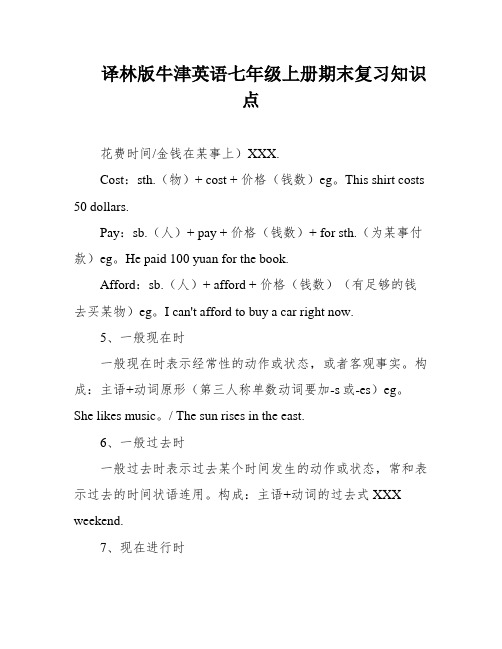
译林版牛津英语七年级上册期末复习知识点花费时间/金钱在某事上)XXX.Cost:sth.(物)+ cost + 价格(钱数)eg。
This shirt costs 50 dollars.Pay:sb.(人)+ pay + 价格(钱数)+ for sth.(为某事付款)eg。
He paid 100 yuan for the book.Afford:sb.(人)+ afford + 价格(钱数)(有足够的钱去买某物)eg。
I can't afford to buy a car right now.5、一般现在时一般现在时表示经常性的动作或状态,或者客观事实。
构成:主语+动词原形(第三人称单数动词要加-s或-es)eg。
She likes music。
/ The sun rises in the east.6、一般过去时一般过去时表示过去某个时间发生的动作或状态,常和表示过去的时间状语连用。
构成:主语+动词的过去式XXX weekend.7、现在进行时现在进行时表示现在正在进行的动作,常和now。
XXX。
currently等时间状语连用。
构成:主语+be动词(am/is/are)+动词-XXX.8、一般将来时一般将来时表示将来某个时间要发生的动作或状态,常和表示将来的时间状语连用。
构成:主语+will/shall+动词原形eg。
I will go to Beijing next month。
/ She shall visit her XXX.9、情态动词情态动词有can/could。
may/might。
must。
shall/should。
will/would。
ought to等。
它们的用法有所不同,但都表示某种语气或情态。
eg。
You should study hard for the exam。
/ She must be at home now.10、被动语态被动语态表示动作的承受者在句子中作主语,动作的执行者在句子中用by引出。
(牛津版深圳版)英语七年级上册词汇详解+练习(含答案)

1. grammar n.语法【衍生】阅读reading听力listening口语speaking/spoken English写作writing【考察项目】常规阅读和完形填空英语学习类文章出现【经典例句】①[牛津高阶字典]I find German grammar very difficult.我发现德语语法很难学。
②[牛津高阶字典]His pronunciation is good,but his grammar is terrible.他的发音不错,但他的语法极差。
2.sound n.声音v.听起来【衍生】感官动词总结:feel感觉look看起来smell闻起来taste尝起来listen to=sound【考察项目】辨析词:sound自然声音voice:人声noise:噪音感官动词+adj.sound+adj.【经典例句】①[课文原句]Learn to say the/i:/,/i/,/e/,/p/and/b/sounds.------学习去读/i:/,/i/,/e/,/p/和/b/这些音。
②[2015年沈阳]It sounds similar.这听起来很相似。
plete v.完成adj.完全的,完整的【衍生】pletely完全地complete=finish完成【经典例句】①[课文原句]Complete an email to a new friend.完成一个给新朋友的电子邮件。
②[牛津高阶字典]You can't leave until you complete the work.你们完成工作后才可以离开。
4.hobby n.爱好(hobbies)【衍生】对比:habit习惯学科:subject运动:sport【考察项目】写作题目:Having a good hobby is./My favourite hobby is.【经典例句】①[课文原句]Friends often write to each other about their hobbies.朋友们经常就他们的爱好写信给对方。
深圳牛津版初中英语七年级上册8个单元全部词汇讲解+词汇近义词+同义词单选题
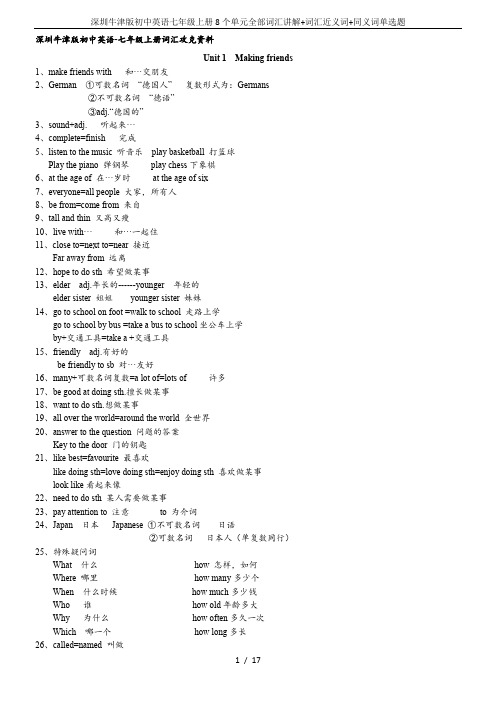
深圳牛津版初中英语-七年级上册词汇攻克资料Unit 1 Making friends1、make friends with 和···交朋友2、German ①可数名词“德国人” 复数形式为:Germans②不可数名词“德语”③adj.“德国的”3、sound+adj. 听起来···4、complete=finish 完成5、listen to the music 听音乐play basketball 打篮球Play the piano 弹钢琴play chess下象棋6、at the age of 在···岁时at the age of six7、everyone=all people 大家,所有人8、be from=come from 来自9、tall and thin 又高又瘦10、live with··· 和···一起住11、close to=next to=near 接近Far away from 远离12、hope to do sth 希望做某事13、elder adj.年长的------younger 年轻的elder sister 姐姐younger sister 妹妹14、go to school on foot =walk to school 走路上学go to school by bus =take a bus to school坐公车上学by+交通工具=take a +交通工具15、friendly adj.有好的be friendly to sb 对···友好16、many+可数名词复数=a lot of=lots of 许多17、be good at doing sth.擅长做某事18、want to do sth.想做某事19、all over the world=around the world 全世界20、answer to the question 问题的答案Key to the door 门的钥匙21、like best=favourite 最喜欢like doing sth=love doing sth=enjoy doing sth 喜欢做某事look like看起来像22、need to do sth 某人需要做某事23、pay attention to 注意to 为介词24、Japan 日本Japanese ①不可数名词日语②可数名词日本人(单复数同行)25、特殊疑问词What 什么how 怎样,如何Where 哪里how many多少个When 什么时候how much多少钱Who 谁how old年龄多大Why 为什么how often多久一次Which 哪一个how long多长26、called=named 叫做27、Would like to do=want to do想做···28、Other adj.其他的,另外的29、Best wishes!祝福用语30、lots of= a lot of 许多,大量的31、In one’s free time 在某人空闲时=in one’s spare time32、hope to do sth.希望做某事(不能说hope sb to do sth)33、hear from=get/receive a letter from 收到···的来信34、write to 给某人写信35、in English 用英语36、on the Internet 在互联网上Unit 2 Daily life1.listen to ·· 听···2. That’s right!正确!All right!好的That’s all right!=You’re welcome!没关系,不客气!3.频率表达:once 一次once a week 一周一次twice两次twice a week 一周两次Three times三次three times a week 一周三次三次以上:基数词+times4.brush my teeth 刷牙ride a bicycle 骑自行车Watch television看电视wash my clothes 洗衣服Play table tennis 打乒乓球play the piano弹钢琴5.love doing sth=like doing sth=enjoy doing sth 喜欢做某事6. Junior high school 初级中学Senior high school 高级中学Primary school 小学7.on foot=walk 步行Go to school on foot=walk to school 走路上学8.at+几点几分at 9:00在九点9.Start= begin 开始end 结束Start at··在··开始end at···在···结束10.be late 迟到be late for school 上学迟到11.different=not ··the same 和···不一样be different from…be the same as…12.in the world 世界上13.morning break 早间休息have a break=take a break 休息一下14.run to···朝···跑去15.Play games 玩游戏play with sb 和某人一起玩16.from···to···从···到····17.take part in=join in 参加18.have a good time=have fun=enjoy oneself 玩的开心19.a.m.上午p.m.下午20.after lunch 午饭后after school 放学后after school activities 课外活动between···and··· 在···和···之间in the morning/afternoon/evening在早晨/下午/晚上21.频率副词:always总是----- never从不(一对反义词)usually通常sometimes有时often经常---seldom 不常(一对反义词)对频率副词提问用:how often 多久一次22.at the end of··· 在···最后in the middle of··· 在···中间at the beginning··· 在···起初23.send sth to sb=send sb sth 送某人某东西24.close 关-------open 开25.do morning exercise 做早操26.go to bed 去睡觉go home 回家get up 起床have lunch 吃午餐have classes 上课27. teach sb sth=teach sth to sb 教某人某事28.arrive in+大地点=get to=reach 到达arrive at+小地点29.cook ①v. 烹饪②n. 厨师cooker n.厨具30.help sb with sth=help sb(to)do sth 帮助某人做某事31.prepare sth 准备某事prepare for··· 为···做准备32.around the world=all over the world全世界33.everyday=daily 每天的34.keep a diary 写日记35.think of···as··· 把···看做····36.tell sb about sth 告诉某人关于某事ask sb about sth 询问某人关于某事ask sb to do sth 要求某人做某事Unit 3 The Earth1.the Earth 地球Earth首字母要大写2.protect v.保护protection n.保护protect sb/sth from ···保护···免受···伤害3、report n.报道reporter n.记者4、be covered by 被···覆盖5、%---percent 百分之···70% 70 percentnd ①v.着陆②n.陆地7.there be 句型,使用就近原则,看第一个名词8.field n.田野,田地a football field 足球场9.under the ground 在地下in the air/sky 在空中on the land 在陆地上10、provide sb with sth=provide sth for sb 为某人提供某物11、pollution n.污染air pollution 空气污染pollute v.污染water pollution水污染12.put···into··· 把···倒入···put on穿上put away把···收好14、stop doing sth 停止正在做的事情stop to do sth 停止正在做的事情去做另外一件事15. It is+adj.+for sb+to do sth 对···来说做某事是···(it is adj+of sb to do sth)16. fact n.事实in fact 事实上17. what else···别的··· what else do you want? 别的你还想要什么18. ask sb to do sth 要求某人做某事ask sb not to do sth 要求某人不要做某事19、some 一些用于肯定句Some用于疑问句的特例:would you like some···?any 一些用于否定句和疑问句(用于肯定句表示任何)20、fewer and fewer 越来越少的比较级+and+比较级越来越···the 比较级,the 比较级越…越…21、catch fish捕鱼22、rubbish=waster 废物,垃圾23、throw away 扔掉throw into 把···扔进24、need sb to do sth 需要某人做某事need to do sth 需要做某事need doing sth 需要被···=need to be done25、smell n.气味v.闻taste n.味道v.尝feeling n.感觉v.感觉feelsound n.声音v.听26、keep sb +adj. 让某人···keep us alive 让我们活着27、lift···up 把··升起来28、in the end 在最后=at last=finally29、breathe v.呼吸breath n.呼吸Unit 4 Seasons1、Australia ①n.澳大利亚②adj.澳大利亚的Australian n.澳大利亚人复数:Australians2、like best=favourite 最喜欢的3、both 都(表示两者)All 都(表示三者或三者以上)4、feel+adj. 感到···feel hot 感到热5、What about you?=How about you?你呢?+doing6、Why not+V-原?=Why don’t you+V-原?为什么不···?7、watch sb do sth 看见某人做了某事(动作已经结束)watch sb doing sth 看见某人正在做某事(动作正在进行)8、leaf树叶----leaves(复数)knife小刀---knives(复数)Wife妻子---wives(复数)wolf狼---wolves(复数)9、what is the weather like?天气怎样?=How is the weather?10、in+时间(年份,月份,季节等)11、start to do sth=begin to do sth 开始做某事=start doing sth=begin doing sth12、get/turn +adj. 变得···get warm变得暖和13、It is exciting to do sth 做某事使人兴奋It is interesting to do sth 做某事很有趣It is nice to do sth 做某事很好It is adj. to do sth 做某事很···14、bright adj.明亮的brightly adv.明亮地Shine brightly15、go on a picnic=have a picnic=go for a picnic 去野餐16、at this time在此时at this time of year 在一年的这个时候17、dry干燥的-----wet潮湿的18、make snowmen 堆雪人19、snowy=snow+y adj.有雪的rainy=rain+y adj.有雨的windy=wind+y adj.有风的cloudy=cloud+y adj.多云的20、fall from··· 从···上掉下来21、spend time with sb 与某人一起度过(时光)= stay with sbspend doing sth 花时间/花金钱做某事22、have fun=have a good time=enjoy oneself 玩的开心23、fun n.乐趣funny =interesting adj.有趣的24、play in the snow 在雪地里玩耍25、heavy rain 大雨heavy snow 大雪rain heavily 下大雨26、lovely adj.可爱的friendly adj.友好的27、get married=be married 结婚28、on Monday morning 在周一上午29、red packet 红包30、the Spring Festival 春节during the Spring Festival 在春节期间during the winter holiday 在春节期间the Mid-Autumn Festival 中秋节the Dragon Boat Festival 端午节31、go+V-ing 表示从事某种活动或者行为go swimming 去游泳go shopping 去逛街32、in the north of+地点在···北部in the middle and east of China 在中国中东地区in the south - west of China 在中国西南地区33、different adj.不同的----difference n. 不同之处34、comfortable adj. 舒服的----uncomfortable adj. 不舒服的35、put forward 提前Unit 5 Visiting the Moon1、how far 多远对距离进行提问2、on+具体某一天on a clear night 在一个清澈的晚上in+上午/下午/晚上/年·· in the morning在早晨at+几点几分at 9:00 在九点3、the Moon 月亮the Earth 地球4、more than=over 超过5、one of+可数名词复数···之一6、travel into space 太空旅行7、leave for 动身去某地8、take···to··· 把···带到···去bring···back 把···带回9、around=about 大约10、in space 在太空中11、It takes one’s time to do sth 花费某人多长时间做某事12、be able to do sth=can do sth能够做某事not be able to do sth =can not do sth 不能够做某事13、have to=must 不得不don’t have to不必14、tie···to·· 把···栓到··上15、so that 以便,为了16、get weak 变得虚弱get+adj. 变得···be weak in 在···方面弱17、do exercises 做操18、float away 飘走float around 四处飘19、help sb (to)do sth 帮助某人做某事=help with sth20、on the Moon 在月球上21、take photos 照相=take pictures22、as···as I can 尽可能···23、love doing sth=like doing sth=enjoy doing sth 喜欢做某事24、enough+名词足够的enough money足够的钱enough+nbig enough足够大adj.+enough 足够25、Don’t worry!不要着急,别担心26、too many+可数名词复数太多···too many太多人too much+不可数名词太多···too much homework27、certainly=of course =sure 当然Certainly not=of course not 当然不28、exciting adj.令人兴奋的(指物)excited adv.兴奋的(指人)be excited about 对···感兴趣29、such as 例如for example 例如(用逗号隔开)30、一般将来时态结构:肯:will+V-原be going to+V-原否:will +not+V-原be not going to+V-原疑问句:Will···+V-原31、That’s a good idea!好主意32、something exciting!一些令人兴奋的事情something interesting!一些有趣的事情不定代词+adj.33、feed V.喂养feed sth to sb 用···喂···feed sb on sth 给某人喂食34、The early bird gets the worm.早起的鸟儿有虫吃。
牛津版初中英语七年级上册知识点练习
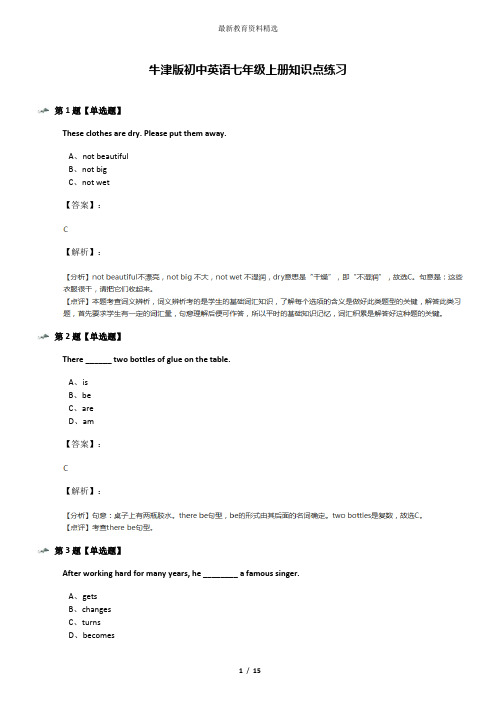
牛津版初中英语七年级上册知识点练习第1题【单选题】These clothes are dry. Please put them away.A、not beautifulB、not bigC、not wet【答案】:【解析】:第2题【单选题】There ______ two bottles of glue on the table.A、isB、beC、areD、am【答案】:【解析】:第3题【单选题】After working hard for many years, he ________ a famous singer.A、getsB、changesC、turnsD、becomes【答案】:【解析】:第4题【单选题】—Do you have any plan for the coming holiday?—Yes. I"ll take a trip to Japan.A、take a flightB、have a lessonC、make a journey【答案】:【解析】:第5题【单选题】一You shouldn"t _____ too much time playing computer games. It"s really bad for your eyes。
一Thank you for your advice.A、spendB、costC、take【答案】:【解析】:第6题【单选题】There are many animals on Earth. Some live _____ the land. Some live ____ the water.A、under; onB、in; underC、on; underD、under; in【答案】:【解析】:第7题【单选题】She"s watching her son __________ a kite.A、flyingB、to flyC、fliesD、is flying【答案】:【解析】:第8题【单选题】— The smoke pollutes the air.一How terrible it is!A、makes……cleanB、makes……sadC、makes……dirty【答案】:【解析】:第9题【单选题】The Red Cross will provide them with food and tents.A、giveB、showC、talk【答案】:【解析】:第10题【单选题】The boy is thirsty, and he would like _______.A、a cup of teaB、a bowl of riceC、a box of chocolateD、a piece of bread【答案】:【解析】:第11题【单选题】一In summer, the sun shines brightly.一That"s the reason why it is so hot.A、gets darkB、gives out lightC、comes out【答案】:【解析】:第12题【单选题】Water keeps fish ________. Without water, fish will die.A、aliveB、lifeC、to liveD、live【答案】:【解析】:第13题【单选题】Forests are very important. They provide us _____ a lot of things.A、ofB、toC、withD、for【答案】:【解析】:第14题【单选题】一They refused to go on a picnic on such a windy day. 一It doesn"t matter. You can do it next time.A、helpB、haveC、provide【答案】:【解析】:第15题【单选题】一Wet floor! Please pay ______ to your steps.一Thank you. I will.A、attentionB、challengeC、influence【答案】:【解析】:第16题【单选题】一I think students should have mobile phones to call their parents.一______. They often use them to play games instead.A、I hope soB、I don"t agreeC、No problem【答案】:【解析】:第17题【填空题】Let"s see what it will be______(like, look).【答案】:【解析】:第18题【阅读理解】根据短文内容,选择正确答案。
初中七年级上册英语牛津版知识点练习
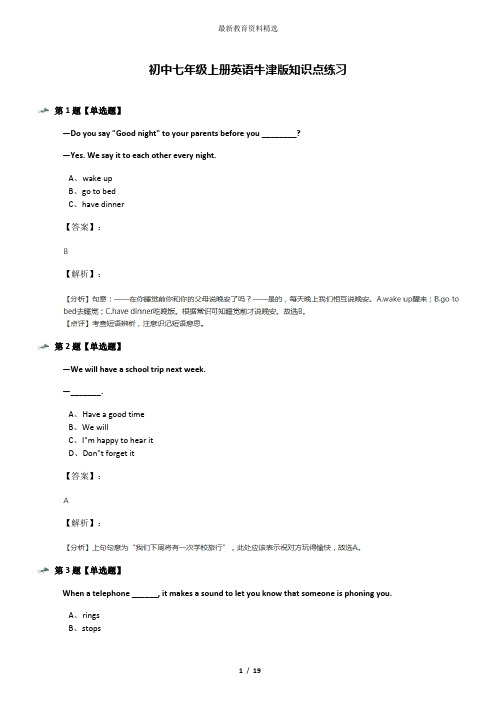
初中七年级上册英语牛津版知识点练习第1题【单选题】—Do you say "Good night" to your parents before you ________?—Yes. We say it to each other every night.A、wake upB、go to bedC、have dinner【答案】:【解析】:第2题【单选题】—We will have a school trip next week.—_______.A、Have a good timeB、We willC、I"m happy to hear itD、Don"t forget it【答案】:【解析】:第3题【单选题】When a telephone ______, it makes a sound to let you know that someone is phoning you.A、ringsB、stops【答案】:【解析】:第4题【单选题】一What time will the meeting end? — At 4:00 in the afternoon.A、continueB、be overC、begin【答案】:【解析】:第5题【单选题】—I lost the chance to the sports meeting. —What a pity!A、pay attention toB、take part inC、look forward to【答案】:第6题【单选题】She doesn"t usually have supper at home.A、buyB、eatC、cook【答案】:【解析】:第7题【单选题】Kate likes to play ________ volleyball with her classmates.A、anB、aC、/D、the【答案】:【解析】:第8题【单选题】—When will you arrive in Britain?—At about 3 o"clock tomorrow morning.B、leave forC、come along【答案】:【解析】:第9题【单选题】—When does your morning break start? —_______ 9:50.A、ToB、AtC、InD、About【答案】:【解析】:第10题【单选题】You must be good at ice-skating!A、do well inB、be fond ofC、be weak in【答案】:【解析】:I have two ______(old) sisters.【答案】:【解析】:第12题【填空题】I"d like ______(go)to the cinema because there is a new film. 【答案】:【解析】:第13题【填空题】I want to make ______(friend) with you.【答案】:【解析】:第14题【填空题】His dream is ______(be) a boss.【答案】:【解析】:完形填空Li Ming is a junior high school student. He loves going to school.Li Ming1up at six o"clock, and he23 7:30. He4 English at 8:005 Maths at 9:00. He6at about 12:00 at school.7 P.E. and art classes8 in the afternoon. He has seven9every day. He leaves school at 6:00 p.m. And he gets10home at about 6:30 p.m.A、getB、getsC、goD、goesA、go to schoolB、goes to schoolC、go schoolD、goes schoolA、inB、onC、atD、aboutA、haveB、havesC、hasD、hadA、andB、orC、withD、toA、eat lunchB、eat alunchC、eats a lunchD、eats lunchA、HisB、HeC、MyD、HerA、amB、isC、areD、beA、classesB、classC、a classD、the classA、toB、theC、aD、/【答案】:【解析】:第16题【完形填空】根据短文理解,从A、B、C、D四个选项中选择最佳答案填空。
2019年精选牛津版初中英语七年级上册知识点练习第一篇

A、gets dark
B、gives out light
C、comes out
【答案】:
【解析】:
The Smiths have a large house in the town.
A、big
B、small
C、beautiful
【答案】:
【解析】:
Peter is good at ______(play, playing)piano.
【答案】:
【解析】:
阅读短文,下列问题
C
Do you know fish come out of eggs when they are born? After the little fish comes out of the egg, it eats the food in the egg. When it is big, it leaves the egg. It swims in the water. You can see the eyes and nose. Its ears are hidden(藏在) in the head.
Some fish eat other fish. Some fish have small mouths and teeth and they often eat plants.
The fish is in ________ before they"re born.
A、an egg
B、the body of its mother
【答案】:
【解析】:
Monica likes to spend her free time ________ her family.
牛津上海版英语七年级上册unit2基础知识练习题
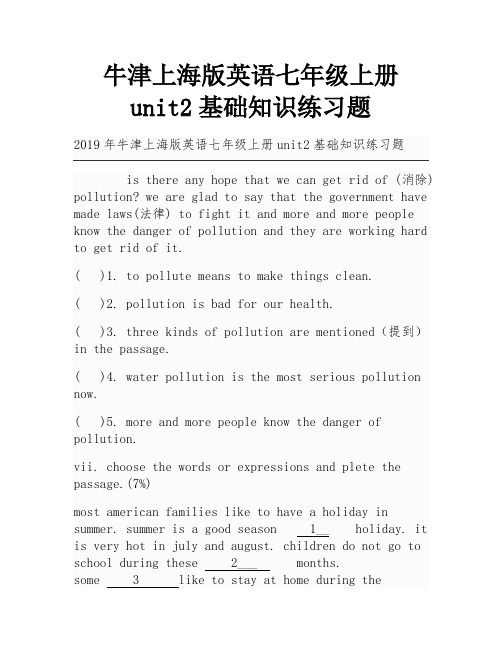
牛津上海版英语七年级上册unit2基础知识练习题is there any hope that we can get rid of (消除) pollution? we are glad to say that the government have made laws(法律) to fight it and more and more people know the danger of pollution and they are working hard to get rid of it.( )1. to pollute means to make things clean.( )2. pollution is bad for our health.( )3. three kinds of pollution are mentioned(提到)in the passage.( )4. water pollution is the most serious pollution now.( )5. more and more people know the danger of pollution.vii. choose the words or expressions and plete the passage.(7%)most american families like to have a holiday in summer. summer is a good season 1__ holiday. it is very hot in july and august. children do not go to school during these 2___ months.some 3 like to stay at home during theholiday. they work in the garden, visit friends, read books, or watch tv. many families 4__ their lunch to a park or somewhere far from the city. they like to eat where there are many trees or there is a nice lake. if they live near the 5 , they often go to the beach. they can fish, swim or enjoy the sun there. america is a large country. many familiestravel by 6 or by train to see interesting places. they also travel by plane to a foreign country. many big cities have many famous buildings, theatres, shops and other places 7 travellers.( )1. a. to b. of c. for d. about( )2. a. two b. threec. fourd. five( )3. a. peopleb. studentsc. man d. woman( )4. a. give b. have c.make d. take( )5. a. city b. town c.village d. sea( )6. a. car b. a carc. their car d. cars( )7. a. inb. for c. on d. atvii. read the passage and fill in the blanks with proper words. (5%)do you know which c is the biggest in china? it’s shanghai. it’s 1,780 kilometres fromguangzhou to shanghai. if you travel by air, you’ll find it very i and fast enough to fly from guangzhou to shanghai. it onlyt you about 3 hours and you’ll get there easily, safely and unhurriedly (从容不迫地).but travelling by train is quite d __ . you have to stay on the train over thirty hours to arrive in shanghai. more and more people like to travel by a____. you can see why, can’t you?viii. writing (作文) :(8%)write a passage of at least 5 sentences about thetopic “my holiday plan for national day”use the following points as a reference.1. what would you like to do on national day?2. which place do you plan to visit?3. how will you go there? why?4. who will go with you?。
初中英语牛津译林七年级上册音标及语音专题讲练
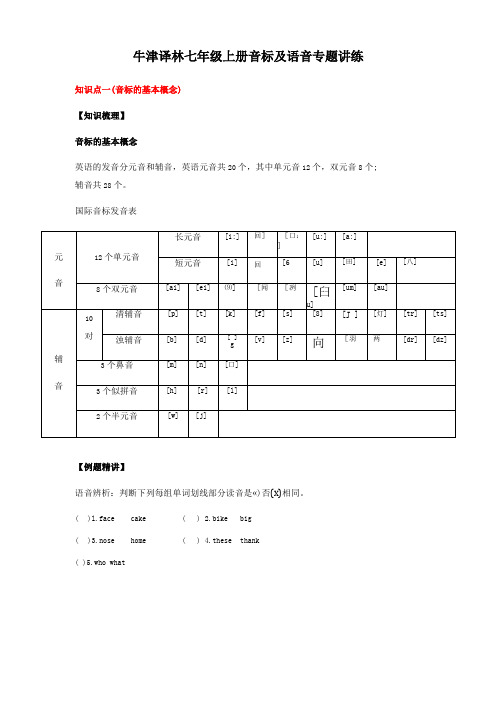
牛津译林七年级上册音标及语音专题讲练知识点一(音标的基本概念)【知识梳理】音标的基本概念英语的发音分元音和辅音,英语元音共20个,其中单元音12个,双元音8个; 辅音共28个。
国际音标发音表【例题精讲】语音辨析:判断下列每组单词划线部分读音是«)否(x)相同。
( )l.face cake ( ) 2.bike big( )3.nose home ( ) 4.these thank( )5.who what【答案】JXJXX【课堂练习】1、下面划线部分的发音不同于其他三个发音的单词是()A、breadB、readC、teaD、sea剖析:字母组合ea有两种发音[i:]和[e]。
在read, tea, sea这三个单词中,ea发[i:]音,在bread中的ea发[e]音。
答案:A2、下面划线部分的发音不同于其他三个的单词是()A、pearB、fairC、fearD、hair剖析:ear, air这两种字母组合有相同的发音[£引,ear除发[£引外还可发[i司这个音。
fear 中的ear发[谄],不同于其他三个。
答案:C3、下面划线部分的发音不同于其他三个的单词是()A、hourB、henC、herD、who剖析:辅音字母h在单词中一般发[h]这个音,B项和C项中的h发[h],D项中的wh [h],A 项中的h不发音。
答案:A4、根据所给的音标完成单词[i:] A、s B、t C、gr n D、b t剖析:根据所给音标[i:],想想哪些字母或哪些字母组合可以发[i:]音,e, ee, ea, i 可以发[i:]音,这下就容易完成了。
答案:A、see B、tea C、green D、beat知识点二(元音&辅音)【知识梳理】1、单元音⑴[i:]:week, bee, see, sea⑵[i]:lips, big, dig, bit⑶[曰二]:third, bird, nurse, her⑷[日]:sister, worker, brother, mother(5)[%]:floor, door, order(6)[ 0 ]:hot, dog, doctor, lot⑺[u:]:food, broom, room⑻[u]:good, book, cook, foot⑼[a:]:car, bar, part, card(10)[ae]:man, apple, map, bag(ll)[e]:yes, bed, egg, elephant (12)[八]:luck, country, cup, duck2、双元音⑴[ai]:bike, like, nice, by⑵[ei]:waste, lake, take, tape⑶[口i]:boy, toy, soil(4)[im]:dear, year, hear, here⑸[Em]:hair, bear, air, chair⑹回]:phone, boat, coat, go(7)[um]:tour, sure⑻[au]:house, now, cow, flower3、辅音⑴[p]:pipe, people, please⑵[b]:baby, bye, book, bit⑶[t]:test, tape, foot⑷[d]:dad, date, desk, dish⑸[k]:cook, cock, class, coke⑹[g]:girl, good, glass⑺[f]:five, forty, fifty, friend(8)[v]:voice, five, visit(9)[s]:six, see, sea, since(10)[z]:zoo, zero(ll)[8]:thirty, three, thirteen, thin ⑫隹]:this, that, those, these (13) [ J ]:shake, she, shame⑭[3]:pleasure(15)[tT]:child, China, chick(16)[dj]:orange, passage(17)[tr]:tree, train(18)[dr]:drink, dress⑲[ts]:cats, coatsQO)[dz]:birds, beds(21)[m]:mum, morning, master, miss(22)[n]:noon, nice, nine(23)[口]:sing, morning, young(24)[h]:home, who, house, how(25)[r]:right, room, roof, radio(26)[l]:late, like, lake(27)[w]:wind, why, wife, wide(28)[j]:year, young, you, yellow【例题精讲】找出划线部分读音不同的单词( )1、A. sun B. mum C. jump D. usually( )2、A. by B. yellow C. year D. yes( )3、A. sea B. cheap C. heavy D. seat( )4、A. time B. swim C. big D. little( )5、A. chair B. child C. school D. match 【答案】DACAC【课堂练习】一、判断下列每组单词划线部分的发音是否相同,相同的用“T”表示,“F”表示1、grade, eraser()2、ten, twenty()3、right, sit()4、but,put()5、old, over()【答案】TTFFT TFTFF6、room, bedroom()7、here, there( ) 8、this, with()9、want, thank()10、nice, big( )不同的用【课堂检测】根据音标发音写单词(各2个)⑴[i:]:(3)[日二]:⑷回: ⑸[为:[句: [问: (8)回]: (9)[翊: (10)[au]:⑪回: ⑫同:⑬[J ]:⑭口]:⑮N]:易错题辨析例判断下列单词划线部分读音是否相同(T/F))1. hand make ()2. left desk)3. mine bike ( )4. nose long答案:FTTF达标检测基础达标一、判定下列各词划线部分发音是否相同,相同的打“4”,不同的打“X”。
最新精选初中英语七年级上册牛津版知识点练习四十二
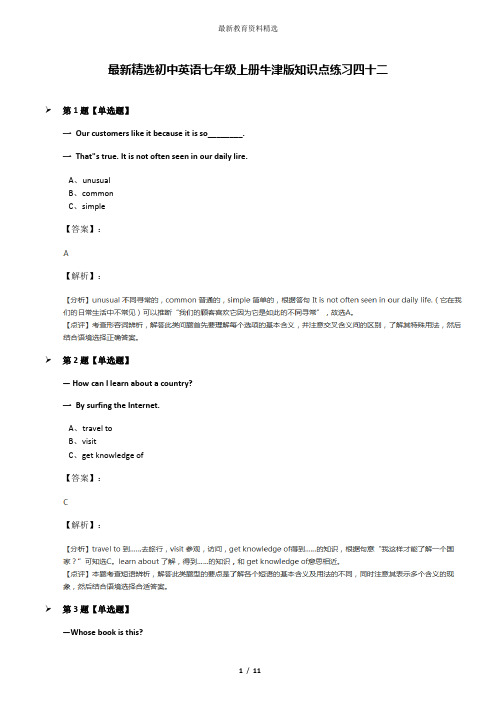
【解析】:
Susan is a top student in our class, so she never _______ an exam.
A、fail
B、pass
C、passes
D、fails
【答案】:
【解析】:
—How do you like the speech yesterday?
【答案】:
【解析】:
根据短文内容,选择正确答案。A Mary is from Canada. She teaches English in China now. She knows a little Chinese. She isn"t free from Monday to Friday. So she often goes shopping on Saturday.Today is Saturday. Mary goes to the shop. She comes out of her car and goes into the shop.“What can I do for you?” the girl in the shop asks her in Chinese. Mary thinks she can tell the girl what she wants in Chinese. So she says in Chinese, “A quilt(被子), please. ” Then the girl goes to the back of the shop. “My Chinese is not bad. The girl understands me,” She thinks. Mary is happy. Soon the girl comes back. She shows Mary a cup.
牛津译林版七年级英语上册音标专题 知识清单(预习复习知识点巩固练习)
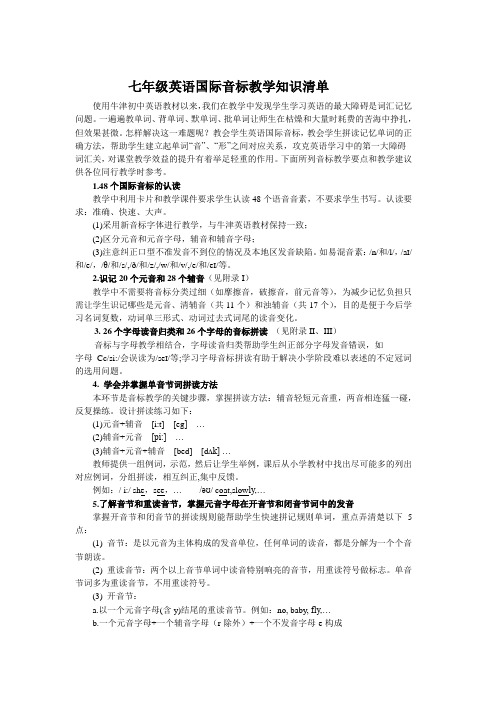
七年级英语国际音标教学知识清单使用牛津初中英语教材以来,我们在教学中发现学生学习英语的最大障碍是词汇记忆问题。
一遍遍教单词、背单词、默单词、批单词让师生在枯燥和大量时耗费的苦海中挣扎,但效果甚微。
怎样解决这一难题呢?教会学生英语国际音标,教会学生拼读记忆单词的正确方法,帮助学生建立起单词“音”、“形”之间对应关系,攻克英语学习中的第一大障碍--词汇关,对课堂教学效益的提升有着举足轻重的作用。
下面所列音标教学要点和教学建议供各位同行教学时参考。
1.48个国际音标的认读教学中利用卡片和教学课件要求学生认读48个语音音素,不要求学生书写。
认读要求:准确、快速、大声。
(1)采用新音标字体进行教学,与牛津英语教材保持一致;(2)区分元音和元音字母,辅音和辅音字母;(3)注意纠正口型不准发音不到位的情况及本地区发音缺陷。
如易混音素:/n/和/l/,/aɪ/和/e/,/θ/和/s/,/ð/和/z/,/w/和/v/,/e/和/eɪ/等。
2.识记20个元音和28个辅音(见附录I)教学中不需要将音标分类过细(如摩擦音,破擦音,前元音等),为减少记忆负担只需让学生识记哪些是元音、清辅音(共11个)和浊辅音(共17个),目的是便于今后学习名词复数,动词单三形式、动词过去式词尾的读音变化。
3. 26个字母读音归类和26个字母的音标拼读(见附录II、III)音标与字母教学相结合,字母读音归类帮助学生纠正部分字母发音错误,如字母Cc/si:/会误读为/seɪ/等;学习字母音标拼读有助于解决小学阶段难以表述的不定冠词的选用问题。
4. 学会并掌握单音节词拼读方法本环节是音标教学的关键步骤,掌握拼读方法:辅音轻短元音重,两音相连猛一碰,反复操练。
设计拼读练习如下:(1)元音+辅音[i:t] [eg] …(2)辅音+元音[pi:] …(3)辅音+元音+辅音[bed] [dʌk] …教师提供一组例词,示范,然后让学生举例,课后从小学教材中找出尽可能多的列出对应例词,分组拼读,相互纠正,集中反馈。
新广州牛津版初一英语上册知识汇总及练习

e.g.My elder brother is one year older than me.6.friendly adj.友好的。
be friendly to sb. 意为“对某人友好”。
friendly 虽然以-ly结尾,但它的词性是形容词,而不是副词。
类似的形容词还有:lovely可爱的 lonely 孤独的 lively 生动的Ugly丑的 silly 傻的 daily 每日的7.many adj.许多的;也可作代词,意为“许多”。
9.enjoy 及物动词,意为”喜欢,享受....”,后常接名词、代词或动名词作宾语。
10.need①作实义动词时,意为“需要”,有人称、数和时态的变化,其后常接名词、代词或不定式作宾语。
need to do sth. 需要做某事。
e.g.We need some water.Ex.Lily and her sister look the same. I can’t tell oneEx. 1)English is my favourite subject,and I am good it.A.forB.toC.atD.of2)Amy is good at .A.swimB.swimmingC.swimingD.swims3.look like表示“看起来像….”look是感官动词,后面跟形容词。
look也可以和like搭配,表示“看起来像….”,后面跟名词。
e.g.You look so beautiful today.e.g.The hill looks like an elephane.e.g.I take the bus to school.= I go to school by bus.6.answer to these questions意为“这些问题的答案”e.g.They need lots of milk everyday.Mr Green knows a lot about China.(作宾语)Monkeys like eating bananas a lot.(作状语)8.hope to do sth.意为“希望做某事”,动词不定时作宾语。
牛津上海版七年级上册Module3语法点综合复习与巩固练习(无答案)
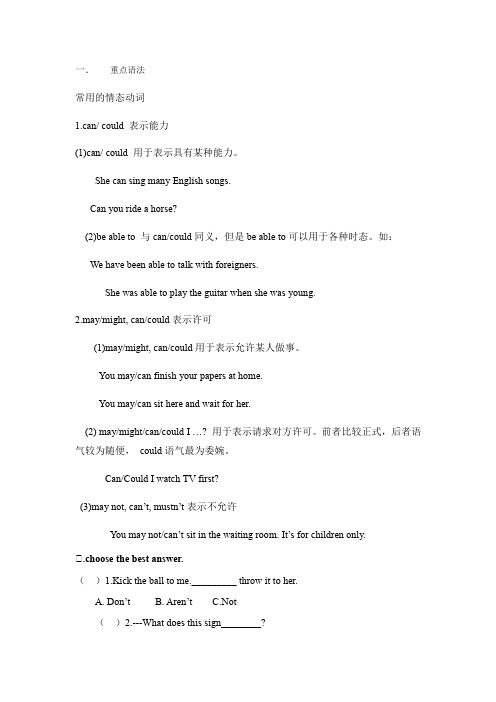
一.重点语法常用的情态动词1.can/ could 表示能力(1)can/ could 用于表示具有某种能力。
She can sing many English songs.Can you ride a horse?(2)be able to 与can/could同义,但是be able to可以用于各种时态。
如:We have been able to talk with foreigners.She was able to play the guitar when she was young.2.may/might, can/could表示许可(1)may/might, can/could用于表示允许某人做事。
You may/can finish your papers at home.You may/can sit here and wait for her.(2) may/might/can/could I …? 用于表示请求对方许可。
前者比较正式,后者语气较为随便,could语气最为委婉。
Can/Could I watch TV first?(3)may not, can’t, mustn’t表示不允许You may not/can’t sit in the waiting room. It’s for children only.Ⅰ.choose the best answer.()1.Kick the ball to me._________ throw it to her.A. Don’tB. Aren’tC.Not()2.---What does this sign________?---It________ you shouldn’t walk on the grass in the park.A.mean;meanB. means;meansC.mean; means()3.The signs________ the lake say ‘No cycling’. We can’t cycle here.A. aroundB. roundC.a round()4. Mum’s coat is black. ________ is white.A. HeB. MineC. Your()5.________ you see the sign over there?A. canB. can’tC. Can’t()6.---Can I ask you a question?----No, you can’t. You________ ask the teacher.A. willB. shouldC. would()7. Which is the first day of the week?_________________.A. MondayB. SundayC. Saturday()8. The boys _________ books in the classroom now.A. are looking atB. are readingC. are seeing()9. The park keeper ________ a sign on the grass.A. pointsB. point toC. points to()10. There’s _________ English book over there. ________ English book is Sarah’s.A. the; AnB. an; AnC. an; The()11----Would you like some_____________?----Just a little.A.apple juicesB.carrotsC. orangeD.pears()12.--__________________________?--Yes,I’d like some green tea.A.What would you like?B.What can I do for you?C.Can I help you?D.A.B.C.()13.Some ___________noodles are nice.A.tomato and eggsB.tomatoes and eggsC.tomato and eggD.tomatos and eggs()14.---Would you like go swimming with us?---______________________.A.No, I wouldn’tB.Yes,I wouldC.Yes, I’d loveD.Yes, I’d love to()15.---Would you like some orange?---______________________.A.Yes, it is.B.Yes, pleaseC.No,I wouldn’tD.Yes, I would()16.---_____________rice would you like?---Medium, please.A.How manyB.What size bowl ofC.What sizeD.What kind()17.---_________________?---Yes,I’d like some bread.A.What are you doing?B.What do you want?C.Can I help you?D.Do you love bread?()18._________like some ice cream and salad.A.He wouldsB.he doesC.He’dD.He wouldn’t()19.We all know beef is ____________meat.A.a kindB.kind ofC.a kind ofD.kind()20.Old Mike has lots of_____________on his farm.Heeats___________every day.A.chicken;chickenB.chickens;chickenC.chicken;chickensD.chickens;chickens( )21.-I am Jim Green. -is my family name.A..JimB.Jim GreenC.GreenD.Green Jim( )22.-What’s your favorite______?BasketballA.sportB.colorC.subjectD.movie( )23.-May I help you?-.A.No,you can’t.B.Yes,please.C.Yes,you can.D.Sorry.( )24.____the man? He is Kate’s father.-.A.What’s.B.Who’sC.Whose’sD.How’s( )25.She can English.A. speakingB.speakC.speaksD.to speak( )26.-Thank you very much.-.A.Thank you very muchB. All rightC.You’re welcomeD.You don’t thank me.( )27.-What color is it?-It’s orange.It’s orange pen.A.a,anB.an,anC.an,-D.-,an( )28.Mrs. Green is Jim’s mother.Jim is her .A.brotherB.sisterC.sonD.daughter( )29.-What you doing?-I’m a book.A.do,seeingB.are,lookingC.do,watchingD.are,reading ( )30.December is _____month of a year.A.twelveB.the twelvethC.the twelfthD.first.( )31.A:My name is Marry. B: I am Jenny.___A.What’s your name?B.Who are you?C.Hello!D.Nice to meet you! ( )32.Does he have a volleyball?Yes, he____.A.doB.haveC.isD.does( )33.Do you like ____?A.bananasB.appleC.strawberrysD.coffees( )34.This story sounds_____.Which is wrong(错误的).A.interestingB.dearC.boringD.scary( )35.___? My birthday is June 1st.A.Where were you born?B.Where are you?C.When is your birthday?D.When is her birthday( )36. Tom ______ carefully but could ____ nothing.A. listened, hearB. heard, listen toC. listened to, listenD. heard, hear fromII. Fill in the blanks with the proper forms of the given words:1. They can see many _____________ (difference) signs in the park.2. Our teacher ______________ (warning) us not to play ball games in the corridoryesterday.3. Can you tell me the ____________ (mean) of this sign?4. Many American young people go ___________ (hike) on their holidays.5. We can store a lot of ______________ (inform) in our computer.6. At the _____________ (begin) of the lesson, the teacher told us a story.7. Though the old man was __________ (die), the doctor was trying his best to savehim.8. I saw a big dog ____________ (lie) in front of his house.9. Last night we __________ back home until the teacher left school. (not go)10. Comrade Li Dazhao __________ in prison in 1927. (put)11. Where is professor Lee?He __________ to the library. He'll come back soon. (go)12. We could not help __________ after we heard the story. (laugh)13 Would you please __________ me an English-Chinese dictionary when you come? (bring)14.He told me that he __________ the Great Wall the year before. (visit)15. I'll tell him the news as soon as he __________ back. (come)16. I twenty pounds for the drawing.(花)III. Rewrite the sentences as required:1. It is a direction sign. (划线提问)__________________________________________?2. This sign means: we must not leave rubbish. (划线提问)。
牛津英语七年级上期各单元知识点归纳
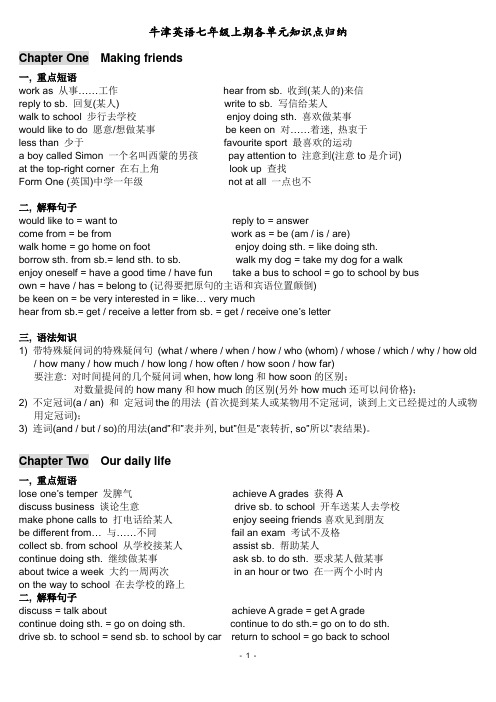
牛津英语七年级上期各单元知识点归纳Chapter One Making friends一, 重点短语work as 从事……工作hear from sb. 收到(某人的)来信reply to sb. 回复(某人) write to sb. 写信给某人walk to school 步行去学校enjoy doing sth. 喜欢做某事would like to do 愿意/想做某事be keen on 对……着迷, 热衷于less than 少于favourite sport 最喜欢的运动a boy called Simon 一个名叫西蒙的男孩pay attention to 注意到(注意to是介词)at the top-right corner 在右上角look up 查找Form One (英国)中学一年级not at all 一点也不二, 解释句子would like to = want to reply to = answercome from = be from work as = be (am / is / are)walk home = go home on foot enjoy doing sth. = like doing sth.borrow sth. from sb.= lend sth. to sb. walk my dog = take my dog for a walkenjoy oneself = have a good time / have fun take a bus to school = go to school by busown = have / has = belong to (记得要把原句的主语和宾语位置颠倒)be keen on = be very interested in = like… very muchhear from sb.= get / receive a letter from sb. = get / receive one’s letter三, 语法知识1) 带特殊疑问词的特殊疑问句(what / where / when / how / who (whom) / whose / which / why / how old/ how many / how much / how long / how often / how soon / how far)要注意: 对时间提问的几个疑问词when, how long和how soon的区别;对数量提问的how many和how much的区别(另外how much还可以问价格);2) 不定冠词(a / an) 和定冠词the的用法(首次提到某人或某物用不定冠词, 谈到上文已经提过的人或物用定冠词);3) 连词(and / but / so)的用法(and”和”表并列, but”但是”表转折, so”所以”表结果)。
Unit7知识点和考点2022-2023学年牛津译林版七年级英语上册
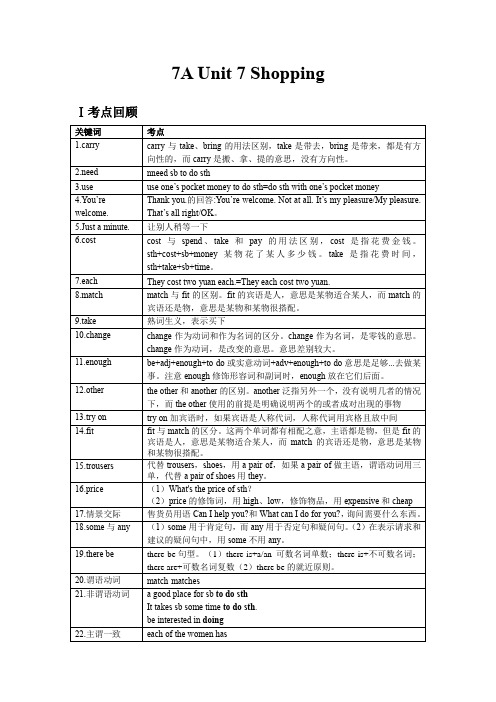
7A Unit 7 Shopping Ⅰ考点回顾Ⅱ考点讲解1.I need you to carry all the bags.(1)carry的基本含义做及物动词,意思是搬,拿,提。
(2)carry的核心考点之一考察carry与take、bring的用法区别,take是带去,bring是带来,都是有方向性的,而carry是搬、拿、提的意思,没有方向性。
(3)carry的核心考点之二考察carry的三单形式,因为carry的三单形式是不规则的。
carry 是以辅音+y结尾的单词,其三单形式为去y改i加es,即carries。
1. Wow, how strong the little boy is! He can the heavy box by himself.A.takeB. bringC. carryD. have答案C2.I need you to carry all the bags.(1)need的基本含义作实义动词,意思是需要。
(2)need的核心考点之一考察need sb to do sth,意思是需要某人做某事。
her.A. to look afterB. looking afterC. looks afterD. look after答案A3.We can use our pocket money to buy them these things.(1)use one’s pocket money to do sth 意思是用某人的零用钱去做什么事,其同义词组为do sth with one’s pocket money.3. —How can we help the children in poor areas?—We can ______________ our pocket money to buy them some school things.A. spendB. takeC. costD. use答案D4.You’re welcome.(1)You’re welcome.的核心考点作为thank you的回答方式之一,其他的方式有Not at all. It’s my pleasure/My pleasure. That’s all right/OK。
- 1、下载文档前请自行甄别文档内容的完整性,平台不提供额外的编辑、内容补充、找答案等附加服务。
- 2、"仅部分预览"的文档,不可在线预览部分如存在完整性等问题,可反馈申请退款(可完整预览的文档不适用该条件!)。
- 3、如文档侵犯您的权益,请联系客服反馈,我们会尽快为您处理(人工客服工作时间:9:00-18:30)。
初中英语七年级上册牛津版知识点练习第1题【单选题】—Finally, I heard from her last Sunday.—Good for you!A、wrote a letter forB、sent a letter toC、got a letter from【答案】:【解析】:第2题【单选题】—I lost the chance to the sports meeting.—What a pity!A、pay attention toB、take part inC、look forward to【答案】:【解析】:第3题【单选题】A(n) ________ is a place where you can buy and sell goods.A、marketB、officeC、bank【答案】:【解析】:第4题【单选题】—_______ are you late?—Because I got up late. Sorry.A、WhyB、WhatC、WhenD、Which【答案】:【解析】:第5题【单选题】I had a good time during the summer holiday.A、enjoyed myselfB、had free timeC、felt bad【答案】:【解析】:第6题【单选题】The ______ of two people is the one who was born first.A、youngerB、elderC、taller【答案】:【解析】:第7题【单选题】一Excuse me, may I sit here?________. The girl on the seat will return soon.A、Yes, pleaseB、I agreeC、I"m afraid not【答案】:【解析】:第8题【单选题】一Mary, get ______ quickly. You"ll be late for school.一I know. Is my breakfast ready?A、upB、toC、off【答案】:【解析】:第9题【单选题】—Would you like to live by yourself abroad?—No. I think I will be lonely and scared.A、with friendsB、on your ownC、without money【答案】:【解析】:第10题【单选题】It is 7:00 am now! I think it"s time for you _______ school.A、forB、to go toC、goD、go to【答案】:【解析】:第11题【单选题】It"s too late now. I think the shop is _______.A、openB、closedC、opensD、closes【答案】:【解析】:第12题【单选题】—Do you know how old Lily is?—Yes. She is 15. We are of the same ________.A、lookB、ageC、size【答案】:【解析】:第13题【单选题】一Do you often exercise, Bob?一No, ______. I don"t like sports at all.A、oftenB、alwaysC、never【答案】:【解析】:第14题【单选题】I live in a flat close _______ Xili Lake.A、fromB、toC、inD、on【答案】:【解析】:第15题【单选题】一Is your friend"s house far away from yours? 一No. His house is close to mine.A、aboveB、nearC、inside【答案】:【解析】:第16题【填空题】I want to make ______(friend) with you.【答案】:【解析】:第17题【填空题】There ______(be) some good news about our football team. 【答案】:【解析】:第18题【填空题】She is a ______(German) girl.【答案】:【解析】:第19题【填空题】I often practice______(play) volleyball, so I can play it very well. 【答案】:第20题【填空题】Don"t copy. You must do the homework by ______(you).【答案】:【解析】:第21题【完形填空】根据短文理解,从A、B、C、D四个选项中选择最佳答案填空。
My uncle works in a shop. It"s near an English1. Every day the students come to2 things. In the3, my uncle gets up at six o"clock and after breakfast he4 his bike to the shop. He5 there at about ten to seven. The shop6 at seven o"clock. The shop sells things like7 and drink. It has school things, too. So there8 a lot of people in the shop from morning to evening. My uncle is very9. He is friendly to the students and the students10 him very much.A、farmB、factoryC、schoolA、buyB、sellC、takeA、afternoonB、eveningC、morningA、drivesB、fliesC、ridesA、goesB、getsC、staysA、opensB、closesC、seesA、pencilsB、foodA、areB、comeC、haveA、angryB、freeC、busyA、thankB、helpC、like【答案】:【解析】:第22题【阅读理解】根据短文内容,选择正确答案。
The sun, the moon and the stars are all in the sky. The earth moves round the sun. And the moon moves around the earth. The sun is much bigger than the moon. It gives us light and heat. When our part of the earth turns to the sun, it is day. When our part of the earth turns away from the sun, it is night. The moon is our nearest neighbor in space. Sometimes it looks quite bright, but it doesn"t give any light at all. The light on the moon comes from the sun, and it only reflects (反射) the light of the sun.The moon is ______ the sun.A、a little smaller thanB、much smaller thanD、twice the size ofWhen our part of the earth Rims to the sun, it is ______.A、dayB、nightC、midnightD、morning______ is nearest to the earth.A、The sunB、The moonC、The starsD、The MarsWhich of the following is TRUE?A、The moon moves around the sun.B、Our part of the earth turns to the sun at night.C、The moon gives us light and heat.D、The moon reflects the light of the sun.【答案】:【解析】:最新教育资料精选第23题【翻译】我愿意周末的时候待在家里。
(would like to)【答案】:【解析】:第24题【语法填空】If you want to watchTV, you should______(finish) your homework first. 【答案】:【解析】:11/ 11。
